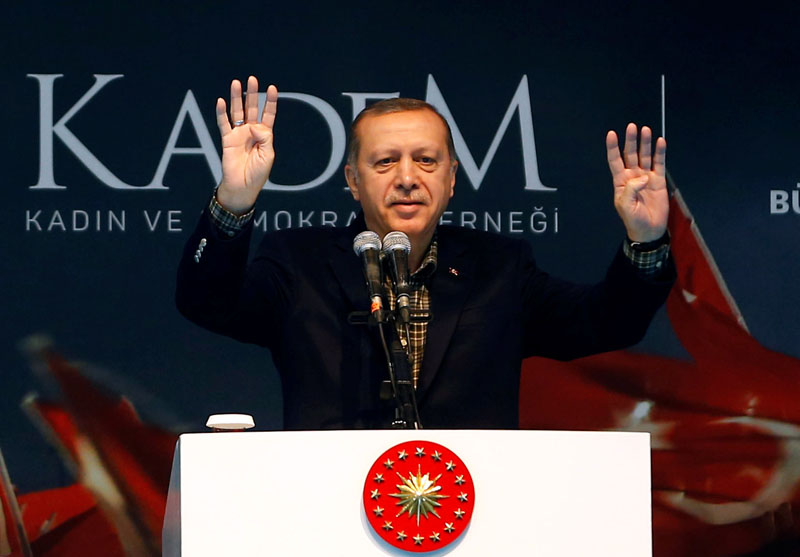Germany rejects Erdogan's 'absurd' Nazi comparison, calls for calm
BERLIN: Germany rejected as "absurd" on Monday Turkish President Tayyip Erdogan's comparison of its ban on several rallies to the Nazi era, but it also stressed the importance of ties between the two NATO allies in an attempt to defuse an escalating war of words.
Erdogan is furious over the cancellation of several political rallies aimed at drumming up support among Germany's large ethnic Turkish population for his plans to overhaul Turkey's constitution and win greater powers for the presidency.
On Sunday the Turkish leader accused Germany of "fascist actions" reminiscent of the Nazi era. Berlin says the rallies were canceled on security grounds.
Chancellor Angela Merkel has been treading a cautious line in the dispute as she needs Turkey's help to tackle Europe's migrant crisis and on other issues, but Erdogan's invocation of the Nazi period clearly touched a raw nerve.
"It is particularly grave, and makes me sad because Nazi comparisons only lead to one thing: The trivialization of the unfathomable suffering of those affected by Nazi crimes against humanity," Merkel said in a short but pointed statement.
Merkel acknowledged deep differences with Ankara over issues such as freedom of the press and the recent arrest of German-Turkish journalist Deniz Yucel.
However, she said Berlin remained committed to basic freedoms and would continue to allow Turkish politicians to campaign in Germany for its constitutional referendum provided their visits were announced in a transparent and timely fashion and respected German laws.
A municipal spokeswoman in Hamburg said a center where Turkey's foreign minister was due to address a rally on Tuesday had been shut, but Turkish diplomatic sources said there were no cancellations and the minister would still travel to Germany.
CALL FOR CALM
Earlier, her spokesman Steffen Seibert dismissed the Nazi comparison as "absurd", but also said both sides should be "calm and level-headed" in managing their disagreements.
EU foreign ministers meeting in Brussels also urged restraint toward Turkey, though Austria and the Netherlands - also home to large ethnic Turkish populations - said they opposed campaigning by foreign politicians on their soil.
Asked whether the European Union should curtail funding aimed at preparing Turkey to join the bloc, Seibert said: "One will certainly have to continually ask the question, as the EU does with all of its spending, whether the payments are achieving the initially intended goal."
On Sunday Austrian Chancellor Christian Kern urged the EU to halt membership talks with Turkey and scrap or restrict 4.5 billion euros in pre-accession aid promised to Ankara by 2020.
Erdogan's comments have prompted shock and outrage among German politicians, and the leader of Germany's Turkish community said on Monday they could harm bilateral ties and further exacerbate tensions among Turks living in Germany.
"Erdogan went a step too far. Germany should not sink to his level," Gokay Sofuoglu, chairman of the Turkish Community in Germany, which groups 270 member organizations, told Reuters.
Seibert told reporters Germany remained committed to good ties with Turkey because of their common interests, including the estimated 3 million people of Turkish background who live in Germany, NATO membership and the fight against Islamic State.
But he said Germany was continuing to press Turkey for fair treatment of the journalist Yucel and his speedy release. The Die Welt correspondent faces 10-1/2 years in prison if convicted of charges of propaganda in support of a terrorist organization and inciting public violence. Yucel denies the charges.
On Monday Taner Yildiz, chief adviser to Turkish Prime Minister Binali Yildirim, accused authorities in the town of Kelsterbach, west of Frankfurt, of cancelling a planned rally at which he had been due to speak.
"We reminded the (local) authorities that this was a democratic right," Yildiz told Reuters, adding that work to secure an alternative venue was underway.
German officials could not immediately be reached to confirm Yildiz's comments.
An estimated 1.5 million Turkish citizens living in Germany are eligible to vote in Erdogan's April 16 constitutional referendum.






